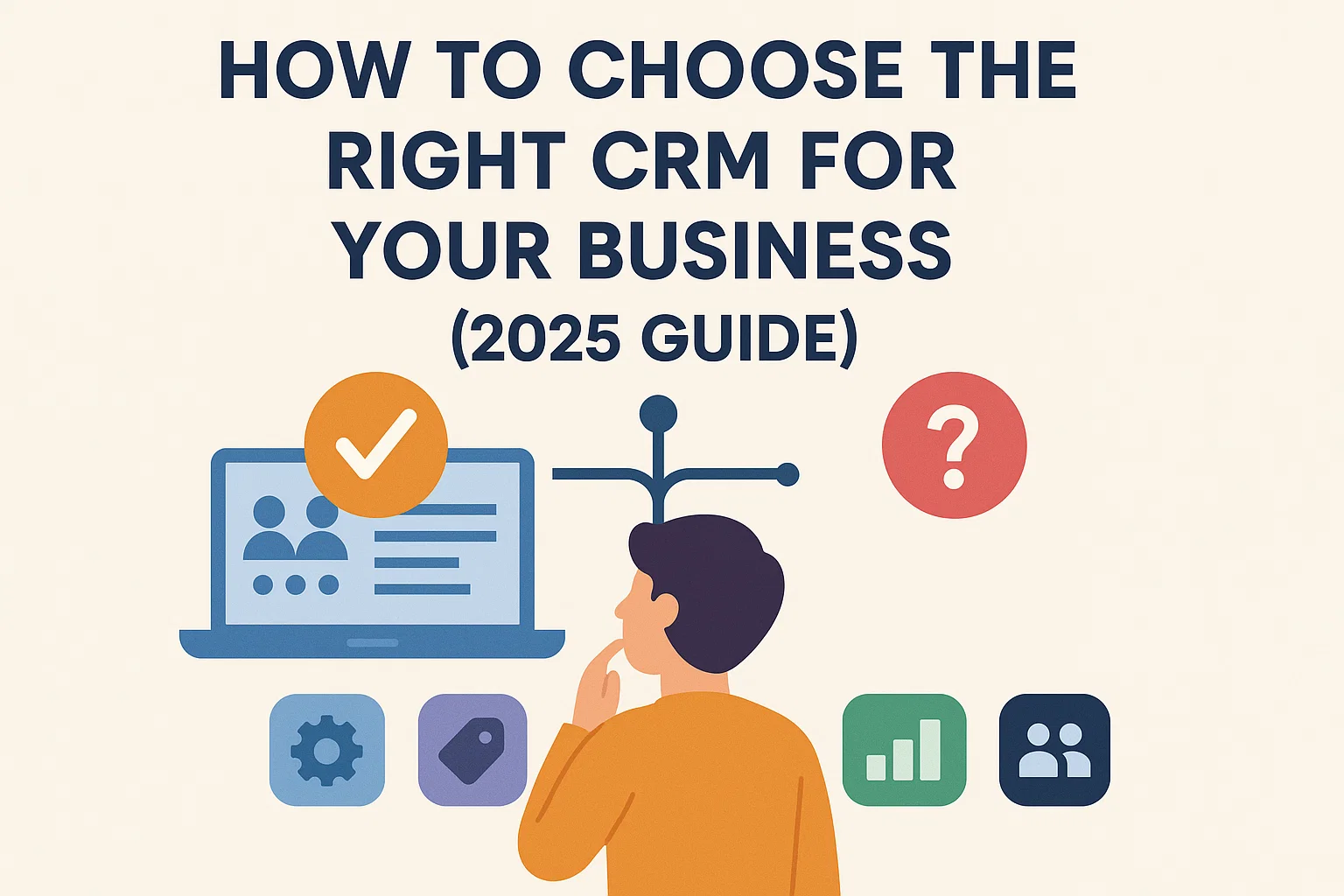How to Choose the Right CRM for Your Business (2025 Guide)

How to Choose the Right CRM for Your Business (2025 Guide)
In today’s competitive market, choosing the right CRM software is crucial for business success. A well-selected CRM can improve customer relationships, streamline operations, and significantly increase revenue. However, with hundreds of CRM solutions available, selecting the one that fits your business needs can be overwhelming.
Why Your Business Needs a CRM in 2025
CRMs have evolved from simple contact management tools into sophisticated platforms that drive sales, marketing, and customer support. Key benefits include:
- Centralized Customer Data: Access all client information in one place.
- Sales Automation: Automate follow-ups, lead scoring, and pipelines.
- Marketing Integration: Manage campaigns, email marketing, and analytics from your CRM.
- Customer Support Management: Track tickets, resolve issues faster, and improve satisfaction.
- Analytics & ROI Tracking: Measure campaign effectiveness and sales performance.
Step-by-Step Guide to Choosing the Right CRM
1. Define Your Business Goals
Start by identifying what you want to achieve with a CRM. Common objectives include:
- Increase sales conversion rate
- Improve customer retention
- Streamline internal operations
- Enhance marketing ROI
2. Identify Key CRM Features
Different businesses require different features. Focus on what adds the most value:
- Contact & lead management
- Sales pipeline tracking
- Email & marketing automation
- Reporting & analytics
- Integrations with existing tools (ERP, accounting, e-commerce)
3. Evaluate CRM Pricing Models
CRMs often use subscription pricing per user/month. Here’s a simplified comparison:
| CRM Platform | Starting Price | Best For | Trial Available |
|---|---|---|---|
| HubSpot CRM | Free – $50/user/month | SMEs, inbound marketing | Yes |
| Salesforce Sales Cloud | $25/user/month | Enterprises, customizable workflows | Yes |
| Zoho CRM | $14/user/month | Small businesses, budget-friendly | Yes |
| Pipedrive | $14.90/user/month | Sales-focused SMEs | Yes |
| Microsoft Dynamics 365 | $65/user/month | Large enterprises, full-scale CRM | Yes |
4. Consider User Experience and Adoption
A CRM is only effective if your team actually uses it. Evaluate:
- Ease of onboarding
- Mobile app availability
- Intuitive dashboards & reports
- Training and support resources
5. Ensure Integration Capability
Your CRM should seamlessly integrate with tools your business already uses:
- Email systems (Gmail, Outlook)
- Marketing tools (Mailchimp, HubSpot)
- Accounting software (QuickBooks, Xero)
- eCommerce platforms (Shopify, WooCommerce)
6. Security & Compliance
High-value businesses and Tier-1 countries prioritize compliance:
- GDPR compliance for EU clients
- HIPAA for healthcare-related businesses
- Two-factor authentication and role-based access
Top CRM Platforms for 2025
Here are the best CRMs for different business sizes and needs:
| Business Size | Recommended CRM | Key Benefits |
|---|---|---|
| Small Business / Startup | Zoho CRM, HubSpot CRM Free | Affordable, easy to use, marketing automation |
| SME / Growing Business | Pipedrive, HubSpot CRM Paid | Sales pipeline tracking, automation, reporting |
| Enterprise | Salesforce, Microsoft Dynamics 365 | Custom workflows, scalability, AI analytics |
CRM Selection Checklist
- Define business goals
- Identify must-have CRM features
- Evaluate pricing & ROI potential
- Check user experience and adoption likelihood
- Ensure integrations with existing software
- Verify security and compliance
- Test free trials before purchase
Tips to Maximize CRM ROI
- Train employees thoroughly on CRM usage
- Automate repetitive tasks to save time
- Use analytics to optimize sales and marketing strategies
- Regularly clean and update customer data
- Integrate CRM with marketing campaigns and eCommerce systems
Conclusion
Choosing the right CRM in 2025 is critical for growth, efficiency, and client satisfaction. By following this guide, evaluating pricing, features, and integrations, and considering user adoption, your business can select the CRM that drives maximum ROI. Investing in the right CRM not only simplifies operations but also positions your company for scalable growth in Tier-1 markets like the US, UK, Germany, and Canada.
FAQs
1. What is the most cost-effective CRM for small businesses?
Zoho CRM and HubSpot CRM Free offer robust features at minimal cost, making them ideal for startups.
2. Which CRM provides the best ROI?
Salesforce and HubSpot provide advanced analytics and automation for high ROI in medium to large enterprises.
3. How do I ensure my CRM is secure?
Choose CRMs with GDPR, HIPAA compliance, two-factor authentication, and role-based access controls.
4. Can I migrate data from my old CRM?
Most modern CRMs support import from CSV, Excel, and other CRM platforms for smooth migration.
5. Should I choose a cloud or on-premise CRM?
Cloud CRMs offer flexibility, scalability, and lower upfront costs, ideal for businesses looking to scale quickly.
Comments (3)